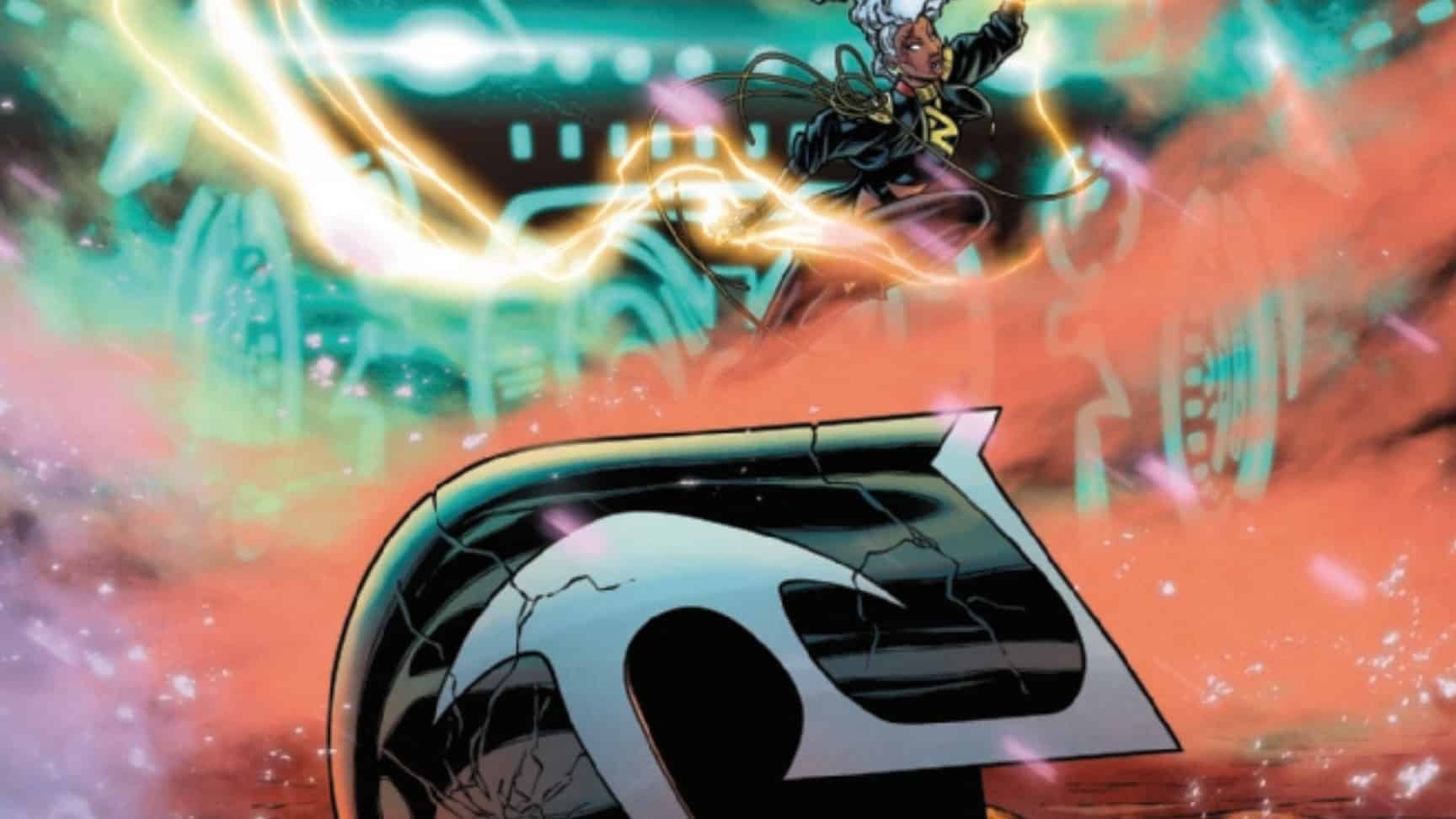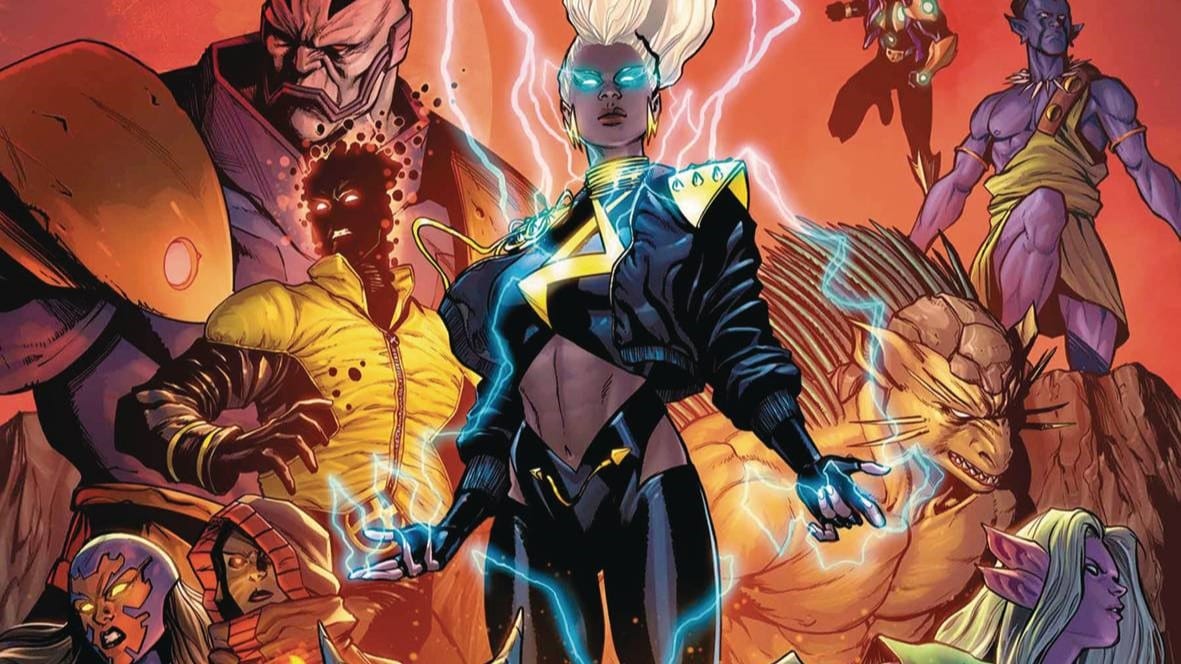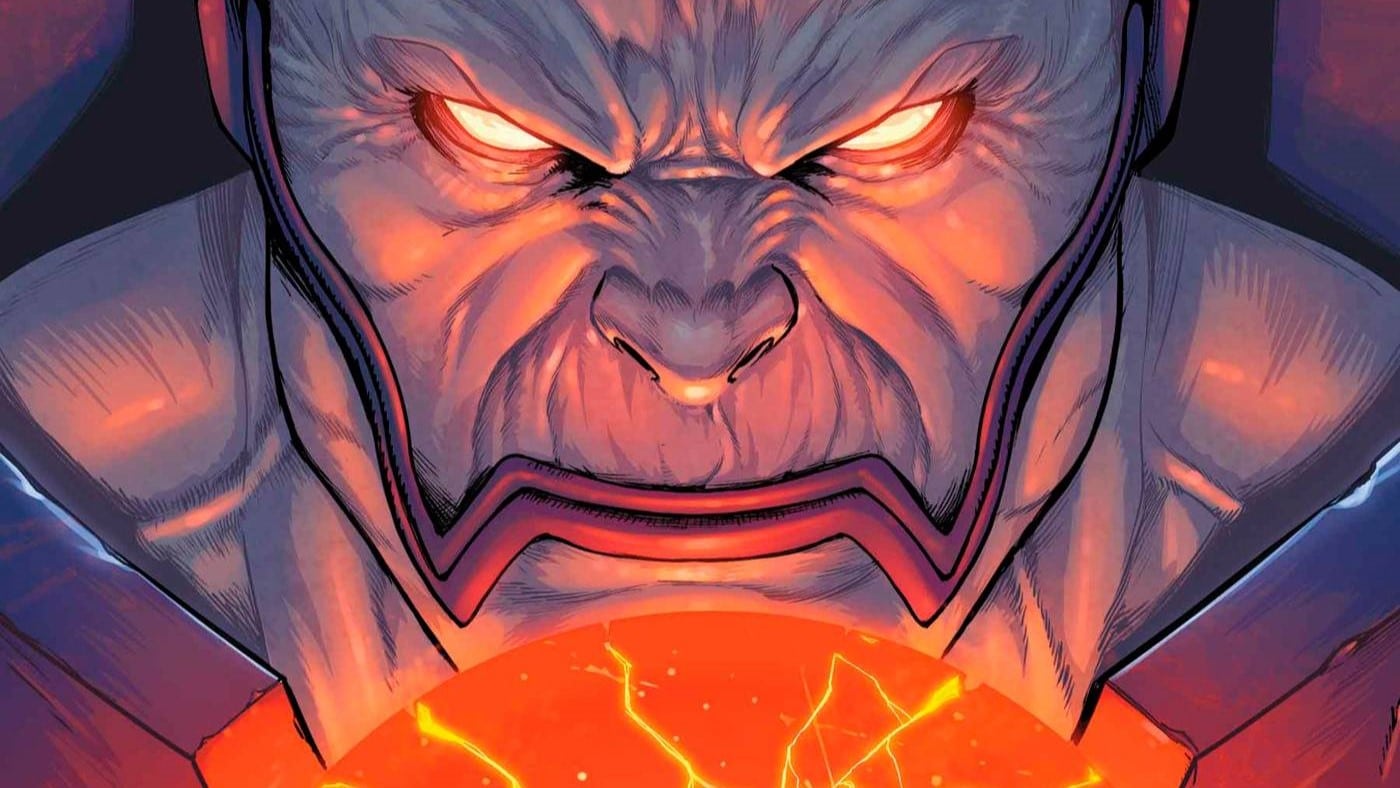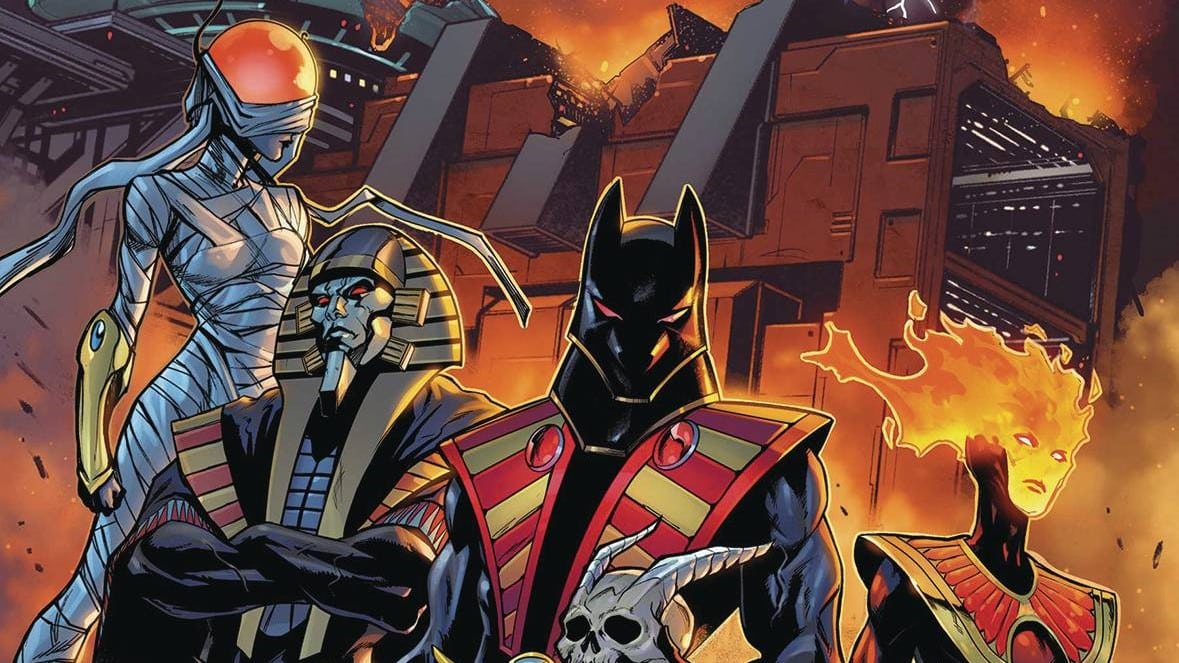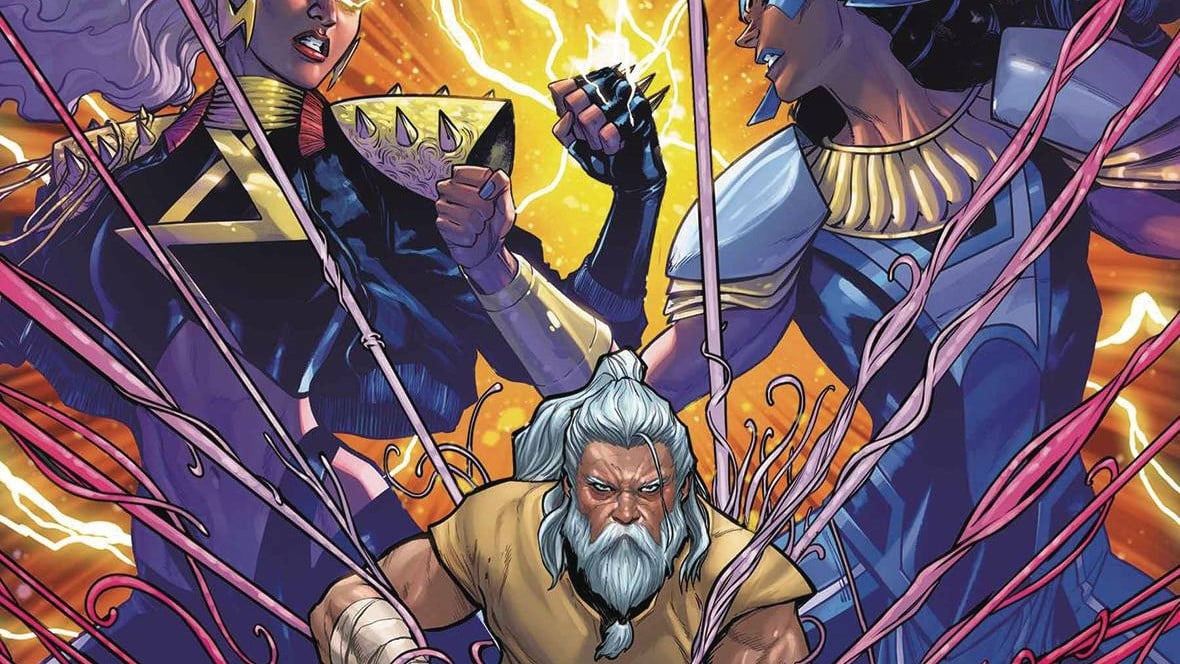Planet Arakko chose peace over war. Now war has chosen them. The monstrous arsenal of the Eternals is on the march. The Arakkii must defend their broken land according to the ancient laws … but against an enemy even older than they are, can the old ways win? Or is a new Arakko about to be born? Find out in X-Men Red #6, written by Al Ewing, drawn by Stefano Caselli, colored by Federico Blee and lettered by Ariana Maher.
Jude Jones: A comic review is simply an answer to two questions: “Is this good?” and “Why should I care?”
The first question is easy to answer: X-Men Red #6 is a masterpiece. It’s brilliant, and brilliance deserves to be bought. Go buy it.
The why, however, requires a little more time. There’s so much here — so many allusions, ideas and ambitions packed into these pages. It’s almost overwhelming.
But that’s what we’re here for.
This is a well-written, well-paced issue, blending pointed social commentary with action and world building (in the middle of someone else’s event no less!) into a cohesive whole. Al Ewing is a mastermind and deserves every bit of the adulation he receives as one of the writers of one of (if not the) best works of the Krakoan era.
Or any X-Men era.
Or any Marvel era.
Yes, it’s that good, and I’m literally bursting at the seams with excitement to share.
Vishal Gullapalli: Couldn’t have said it any better. I get this feeling every issue, yet each time it feels like something I’ve never encountered before. What a special comic this is.
The Truth Is Spoken

Jude: When we first met the Arakkii in X of Swords, the humanoid characters — Isca, Genesis and Bei — had full lips, wide noses and tightly coiled hair let out in braids, locs and a twist-out.
The Arakii were forcefully displaced from their homeland, caught in a millennia-long confrontation, only to lose the war along with their land. Death, imprisonment or genocidal capitulation were their only options. And of those who led the genicide — Genesis under the dominion of Annihilation; Isca the turncoat; Tarn and the Vile schools — would sit on the ruling council of the people, directing policy as if their legitimacy was earned or pure.
It was not.
The people, reeling, formed a culture based on survival. A culture whose words, mannerisms and thoughts were all shaped by this multigenerational trauma. A culture based on strength not out of sadism, but out of survival. Even now, as they have a planet to call their own, they shun deference to anything implying weakness, even in the most benign of times and words, for fear that weakness will bring back the times of pain.
Many people can see themselves in their plight, and while analogies are imperfect, when done right they can be masterful.
Thus leading the issue with Dr. Craig Marshall, a Black NASA astronaut who finds himself defending Arakii children, makes this coded subtext EXTREMELY textual. Note how he feels comfortable there; note how he approaches the people with humility and kindness, and they repay him with trust; note how he has no desire to change the culture of the people, only to embrace it and add to it.
Vishal: This isn’t the first time Ewing’s made me genuinely emotional with the simple idea of regular people doing what they can to help. The last four pages of Captain America and the Mighty Avengers #9 feature a first-person view of a doctor waking you up and informing you that you were knocked out trying to save someone from a collapsed building as the universe literally ended. And he tells you, as you watch the world turn to white and all of existence cease, that those little moments, those choices to help knowing how little you could do, those are what matter. When you were powerless, you still chose to help those even more powerless. You were a hero.
Dr. Craig Marshall was a hero.
And I don’t mean to undercut the extremely well-done racial analogy or present this as Ewing repeating his ideas. Far from it. I just wanted to draw attention to his ability to introduce you to someone you’ve never met before and likely never will meet again, and make you care about them in the span of four pages. There’s plenty of writers who try to bring in the theme of regular people being heroes, but in my experience none are so effective at it in so little time as Ewing.
There’s also something to be said about this concept of who you choose to be during the moments that could be your last that ties in fantastically with the actual event here. While the baby Celestial is judging all of Earth over in Judgment Day, Dr. Craig Marshall clearly deserves a thumbs up.
Jude: Note how Karen Brand “warned” Craig about the people in a way that was informed solely by her prejudice and arrogance. That a Black man would feel comfortable among these people because he instinctively understood how to respect and embrace the people — this is how you make analogies stick.
In fact, note Storm’s arrival with Sobunar and Lactuca. Her trope of asking permission before engaging in battle is both respectful of the culture (where help is, as we’ve seen, a dirty word) and of the \self-determination of the people (who deserve to be supported, not lorded over). That the half-Kenyan, half-Harlemite mutant (of course) understands how to relate to the people, even (especially!) in times of distress makes the subtext, the analogy, clear as day:
Yes, the Arakkii are Black coded, and Black people are catching hell.
But the Arakkii, like Black folk, are resilient out of necessity. They will fight to the last person standing and beyond.
But what does it mean to fight in this world?
There Is No Me

Jude: Storm’s arrival and subsequent dismantling of Uranos’ war machine was, as always, beautiful. Not simply because of how she did it (using Sobunar to refract light, giving her cover to strike the threat down), or how it looked (beautifully illustrated). This physical fight is the lesser of the two fights she’s facing; her internal fight — the fight within herself, to assuage her guilt for not being present and to plan how she will redeem her people and herself — sets the tone for the issue.
Too many comics (and movies) think a brawl with cosmic stakes is enough. But just like movies with too much CGI, those cosmic brawls often feel weightless, overwrought, fake. It’s the internal fight that adds gravity and depth to those punches; the internal fight gives the external one gravitas.
Vishal: All credit in the world to Stefano Caselli, who gives the entire issue a sense of magnificence and intimacy simultaneously. We see the glory of mutantkind, of Arakko, just as we see the true faces of their people. This comic is cool as hell, and it also makes sure to slow down and really get you in to understand its characters, even the ones who only briefly appear.
Jude: We first see Lactuca in Planet Sized X-Men, after she transports all of Arakko to Mars. There, she notes (through Jean) that “she knows what is in our hearts.” At the time, I think most of us thought she was just being kind, or maybe a little petty and dismissive. Little did we know she was being literal. Lactuca’s power is knowing where everyone is — physically and emotionally. She’s not just a teleporter; she’s a telepath of the highest magnitude. She’s able to know what someone is thinking and feeling in the moment.
Lactuca’s power to find where she’s most needed isn’t merely about who is fighting the biggest guns; it’s about who is in the most pain, whose internal fight is the most dire.
And as she shares this power with Storm, as we get character depth, insight and contextual exposition that’s as informative as it is earned. Note that we read the panels in first person, even though we’re reading them through Storm’s perspective. We are literally in their mind with Storm, occupying the exact physical and emotional space as them. And what do we see when we see them? Well …
See Richard Rider, fighting with his own guilt and responsibility, shouldering an impossible burden that he cannot — should not — be responsible for (ergo why his connection to the land is sound — among the Arakkii he is, for better and worse, among like-minded people).
See The Fisher King, fighting the memories of his past to ensure a better present.
See Isca, “fighting fish,” and as always, submitting to her gift. (That Arakkii powers are double-edged burdens that cut their masters just as much as they cut their enemies is such a unique perspective; I hope writers continue to play with that notion).
See Wrongslide, whose name is a self-actualized appropriation of a slur (so of course he fits in) fighting feelings of anger.
See Khora fighting memories of loss brought on by the scent of jasmine.
See Brand, the master schemer, fighting feelings of vulnerability, as she is in a place where she has absolutely no control — emerging from her egg, all her grand schemes in the mind of the Professor. Will he take a look? Has he already?
And Magneto? See Magneto fighting for the life of this planet as his life, kept together by expert concentration, continues to slip away.
This is where Storm is most needed — not where the biggest fight is, but the person she can best help. That is who she is. And that’s what makes her such a dangerous foe. Remember, Storm and Magneto don’t have backups. Once they die, they die (supposedly). Storm, as we saw in Giant-Size X-Men: Storm a few years ago, wants to live; and despite how depressed Magneto is, she wants him to live, too — probably more than he does. Her choice isn’t just about saving lives — she goes to Magneto to save his soul.
Lucky for her, she has some help.
Time Is Too Short

Jude: We finally see The Night Seats of the Arakko Council. From such a pugnacious presenting people, and given the malicious secrecy of Krakoa, I expected the Night Seats to be filled with spectacularly powered mutants, held in waiting until desperation called them. I was halfway expecting Genesis and Apocalypse to manifest, laying waste to the machines and taking the fight to Uranos.
What I got, however, was something much different and, honestly, much much better.
The Arakkii have always favored the strong — only omegas on the council — but the Night Seats, as the (really really good!) data page notes, were to be a check on this power. Self-recruiting, self-replicating — this is democracy. And as the arrogance of power blinded the strong into subverting this democratic norm, so were the people subjugated to generational horrors. Again, Ewing makes subtext clear: Power unchecked is power tainted, and great power doesn’t always come from great power sets; it comes from great spirits.
And who are the spirits of this night council?
Syzya of the Smoke — a pink, demon-failed, four-eared female-presenting transporter who leaves behind a scent of jasmine when they teleport. They were prevented from using their power in the Vile prisons, so they move in silence, transporting to places they know, seeking never to be caught again. She’s clearly an analog of Nightcrawler (blue to her pink, male to their female-presenting, his acrid brimstone scent to their sweet jasmine. This could be just a cute coincidence, or this could be something more.
The Man with No Name, aka the Fisher King. They took his name and his identity (Sound familiar?), so he forged a new one out of nothing. The “omega of nothing” saw the need for Night in the Vile prisons (where he would lose his wife and one child, while his other, Khora (!!!!) survived) and was a leader of a revolution — thus the respect his (lack of?) name carries among the people.
And — oh surprise, surprise — Roberto Da Costa. The man with many secrets and even more resources found the members of this extremely quiet council and, as members choose to be appointed (as opposed to fighting for appointments), he appointed himself to this most quiet of councils.
This subversion — Night being explicitly non-omega in power, self-selecting in appointment and quiet, if not humble in demeanor — adds yet another layer to the Arakkii mythos. We see that at some point, the naked purist and worship of power was not the way of the people; that power for power’s sake was a learned behavior, a trauma response. This is likely not what the reader expects — it’s not at all what I expected at least — thus why I appreciate it all so much more. Good surprises are few and far between in this world.
Cherish them when you see them.
Vishal: Ewing’s take on Roberto, as I feel like I say every time I write about this book, is sublime. He becomes the most interesting character in the room, no matter what room he’s in. He’s always got plans in action, and the ones you’re aware of barely scratch the surface. He’s not necessarily the smartest person in the room, but he makes up for it by having thought so many steps ahead he might as well be able to see the future. There’s no situation where Sunspot can lose, because he’s already accounted for it. And even when I think I can predict what he’s going to do next, he swerves me. I love this reveal.
Jude: So much about Arakkii society is a response to trauma, and yet we see that trauma response is not always helpful. Fighting as one-off units, where ritual pride prevents you from seeking help or working as a team, is keeping the Arakkii from winning.
Yet teamwork — kin to that other dirty word help — is exactly how the war is being won. See the gains of the Brotherhood, with Sunspot, Wrongslide and Khora working in unison. See the elimination of the silicone gorilla, with Magneto making use of Lodus Logos’ gift of metal words.
And see, as that gorilla revives itself, how gloriously teamwork takes it down again.
Storm, acting as an omega defibrillator, gives the heartless Magneto a power boost, keeping him going and acting as a conduit to more permanently put down the plastic beast. Storm’s presence as an elemental, a life giver, a healer, extends beyond her powers. She lives as an example of what people can become when they give of themselves for others.
This is one of the more affecting moments of the series. In concept and wording, it’s amazing. Acknowledging that electromagnetism connects the two mutants is pertinent; seeing Storm use something that was once meant to hurt her (Magneto using her electric bolts and a power-up that takes her life force) as a means of healing is profound. Seeing the overt sexual connotations, if not outright eroticism of the moment was … well, a smidge disappointing. I’m sure most will find the visuals amazing, I argue a more explicitly erotic visual would have matched the word choice a bit more.
No matter. This was — is — great work. Storm, giving from a position of power and making herself vulnerable to save someone who’s hurt — that’s unheard of in Arakkii culture.
But as Xilo notes, maybe it’s time to write a new history.
And as the team assembles to take the fight to Uranos, one can only imagine how that new history will play out.
Except, you don’t have to wait, because A.X.E.: Judgment Day #4 takes place right after this issue and serves as an unsatisfying coda to this fight.
I don’t want to ruin that comic for you, but I will say the resolution — or what we see of it — is anticlimactic. It ruins the buildup of this issue with a resolution that’s all too brief and too dependent on Tony Stark. Yes, help is a beautiful thing, but the help has to be asked for. Earned. And this … this wasn’t.
I had no idea what to expect in this issue. “The Hour of Magneto” implied a rage that was missing here, blessedly not to the detriment of the narrative. It’s possible that gaps in plot and pacing we see in A.X.E. #4 get the proper attention and context they’re owed in the next issue of X-Men Red. But even if the images in A.X.E. are a fake-out or incomplete, it’s still frustrating to see the grandeur presented here get sniffed out so wantonly. X-Men Red is amazing, steered by an amazing team; the parts of Red that appear in A.X.E., stripped of their care and nuance, prove just how tenuous amazing can be if not constantly curated in the right hands.
X-Men Red is amazing, and the comic, and its fans, deserved better than what they got in A.X.E. #4.
Vishal: I think I enjoyed it more than you did, but I also can’t disagree with anything you said. The scene that this issue leads to should have gotten more page time, and more significance, and we can really only hope that the next issue picks up some of the threads that feel like they got compressed.
X-traneous Thoughts
- Craig Marshall is a Black Ass name.
- The Arakkii are communists, and it’s a good thing. Don’t tell Fox News.
- I wonder: Does Charles ever peek into those minds he holds in Cerebro?
- For those not keeping up with Legion of X, the Inward Watch enforce Arakkii law, including those who run from challenges.
- “We did not come to make love; we came to make war.”
- The power of memory is a theme here. They took the Fisher King’s
- Cable continues to plan something, and I can’t wait to see what it is.

